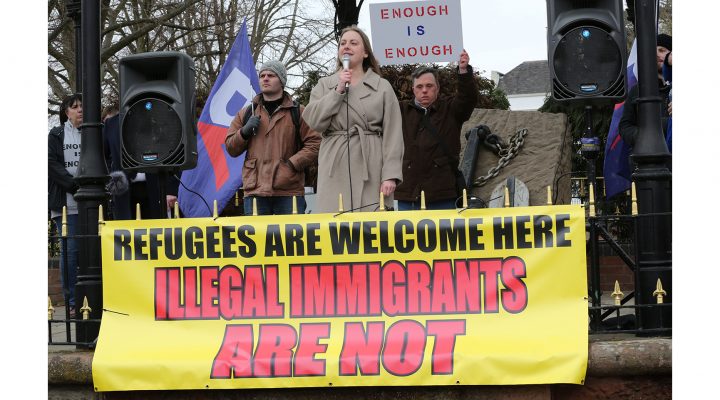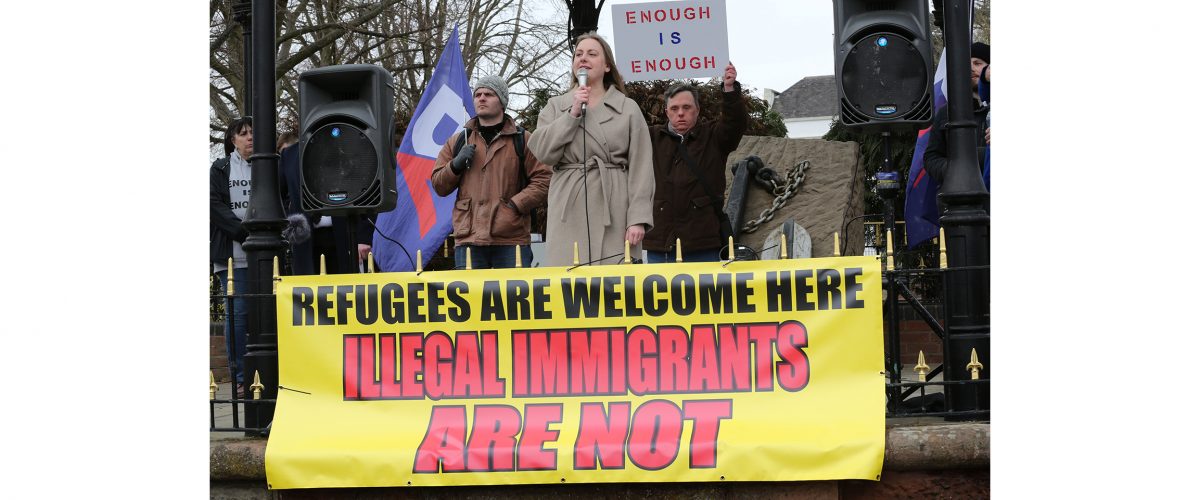First, the United Kingdom’s government proposed shipping off asylum seekers to Rwanda. That process was ruled illegal by a UK appeals court, but Parliament found another way to block the arrival of asylum seekers.
On July 18, conservatives pushed through the Illegal Migration Bill, called by British Prime Minister Rishi Sunak the “stop the boats” bill.
Sunak said this is the “toughest” law yet in the UK’s efforts to deter migration to the UK. According to media reports, more than 45,000 people sought refuge there in 2022 alone.
The bill was not passed without a fight, however.

Justin Welby, archbishop of Canterbury delivers his Easter Sermon at Canterbury Cathedral on April 17, 2022, in Canterbury, England. (Photo by Hollie Adams/Getty Images)
Among those opposing its passage was Justin Welby, archbishop of Canterbury. He voiced his displeasure over “shrill narratives that all who come to us for help should be treated as liars, scroungers or less than fully human.”
Some other religious leaders and refugee and human rights groups also opposed the bill, saying that it was at variance with UK values.
One of those opponents was Anglican Bishop Guli Francis-Dehqani, who arrived in the UK from Iran as a refugee at age 14.
“This bill would allow the UK to turn its back on people in desperate need — denying safety to those who are vulnerable,” he said at a video event coordinated by Together with Refugees. “Instead, it would lock up people who have fled terrible circumstances in fear for their lives. I arrived in this country aged 14 and was given protection and welcome. But the proposals in this bill would mean detaining children who need help behind bars.”
Francis-Dehqani declared: “I am proud to join with other faith leaders to stand with refugees against this bill. It does not represent who we are as faith leaders or as a nation.”
The 14 contributors to the video collectively stated: “As people of faith, we strive to welcome the stranger, to offer hospitality, to love, protect, listen, learn and show compassion. This is who we are. Across the UK, now and throughout history, individuals and communities of faith have welcomed refugees into their homes and lives. When people travel across borders because they are fleeing war, persecution or oppression, we are ready to play our part.”
“Instead of hospitality, it treats people with hostility, discrimination and distrust.”
The Illegal Migration Bill, they said, “will deny people desperately seeking safety in the UK the right to community, peace, compassion and security. It will ban people from getting the protection they need, punish them for seeking sanctuary, and separate families. Instead of hospitality, it treats people with hostility, discrimination and distrust.”

Prime Minister Rishi Sunak onboard Border Agency cutter HMC Seeker during a visit to Dover, ahead of a press conference at Western Jet Foil in Dover, as he gives an update on the progress made in the six months since he introduced the Illegal Migration Bill to “stop the boats”, on June 5. (Photo by Yui Mok – WPA Pool/Getty Images)
Prime Minister Sunak told the Daily Express he and his allies persevered to do what they think is right.
“Sir Keir Starmer (opposition leader) tried to frustrate us at every stage — whipping his MPs and peers to vote against our Stop the Boats Bill over 70 times in the last few months to try to water it down,” the prime minister said. “I have made it my mission to stop the boats — not because it’s easy but because it’s the right thing to do.”
The new law should send a tough message to would-be migrants, he said. “We will put the toughest-ever set of laws onto the statute book, sending a clear message to people everywhere that if you come here illegally you will be detained and removed.”
Mirroring debate over immigration in the United States, the prime minister accused the opposition of advocating for “open borders.”
Now the government will focus on appealing the court ruling against its plan to send migrants to Rwanda.
In blocking the plan, the court said migrants sent to the East African country still would face the risk of being sent back to the countries and conditions they fled from.
“I strongly believe the Rwandan government has provided the assurances necessary to ensure there is no real risk that asylum-seekers relocated under the Rwanda policy would be wrongly returned to third countries,” Sunak countered. “Rwanda is a safe country.”
The Equality and Human Rights Commission disagrees.
“The EHRC has consistently highlighted the risks of this policy, urging the UK government to ensure that it remain compliant with international human rights obligations,” the group said in a statement. “The court of appeals ruling raises specific concerns about this asylum and immigration policy that risks exposing people to harm and placing the UK in breach of its legal obligations to protect human rights.”
Anthony Akaeze is a Nigerian-born freelance journalist who lives in Houston. He covers Africa for BNG.
Related articles:
On migrant crisis, the U.S. and UK governments share a controversial tactic in common
Why most everything you think you know about global migration is probably wrong
A tragic tale of death on the Mediterranean Sea amid Tunisian and British migrant backlash


